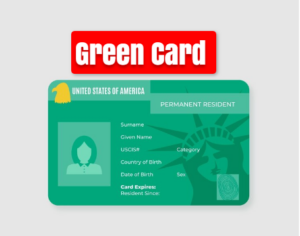Green Card vs. Visa: A Guide on Differences, Benefits, and Types

One of the most often-asked questions involves the difference between a green card and a visa because immigration regulations can sometimes be complicated. Both documents are required for foreign people hoping to enter, work, or live in the United States. But knowing the details of this paperwork is crucial, particularly if you are looking for work or intend to be in the United States long-term. This guide will go over all you need to know about the difference between a green card and a visa to help clarify the process.
What is a Visa?
A visa allows foreign nationals to enter the United States for a designated use, like tourism, employment, or study. Several kinds of visas are generally distinguished from immigrant visas versus non-immigrant visas.
Types of Visas
- Non-Immigrant Visa: Those who want to visit the United States temporarily should apply for a non-immigrant visa. Typical instances are work visas, tourist visas, and student visas. These visas are usually valid for a specific duration, and once they expire the visa holder must depart the United States unless they seek for an extension or change of status.
- Immigrant Visa: Those intending to live permanently in the United States are eligible for an immigrant visa. Once you have an immigrant visa, you may seek a green card, which gives you legal permanent resident status.
Key features of a Visa
- Either temporary or permanent (depending on type)
- Needs renewal or modification based on your immigration status
- Allow access for a specified goal—work, education, travel
We’ve discussed yet what a visa is now, let us now discuss the green card vs visa argument and its importance.
What is a Green Card?

A green card lets a foreign national permanently reside and work in the United States. Often referred to as a Permanent Resident Card, this certificate marks legal permanent residence and provides the cardholder with various advantages similar to those experienced by American nationals. One can get green cards through family sponsorship, work, or Asylum among other ways.
Green Card Categorization
The situation of the applicant determines various types of green cards available:
- Family-Sponsored Green Cards: For those with immediate family members either permanent residents or U.S. citizens.
- Employment-Based Green Cards: For those offered a job in the United States and satisfy particular employment criteria.
- Asylum or Refugee Green Cards: For those awarded U.S. refugee or asylum status.
Key Features of a Green Card
- Pathway to U.S. citizenship
- Permanent residency
- Right to work in the United States without limits
- Renewal every 10 years
After we have the fundamental definitions, let’s explain the main variations between the green card vs visa.
The Main Differences Between Green Card and Visa

Although foreign nationals may enter and stay in the United States using both a green card and a visa, they have different roles. Let us investigate the difference between a green card and a visa.
- Purpose: A green card and a visa differ mostly in their use. While a green card offers permanent status, a visa permits temporary access into the United States for particular reasons—work, education, or travel.
- Duration: Usually a visa is temporary, not permanent; a green card provides long-term residence. Most non-immigrant visas have expiration dates, therefore the person must either leave the United States or seek a renewal. On the other hand, although the resident status is permanent, a green card must be renewed every 10 years.
- Work Authorization: Without further employment verification, a green card offers complete work authorization throughout the United States. Most work visas, on the other hand, are employer-specific, hence you can only work for the sponsoring company. If you change jobs, you could need a new visa.
- Path to Citizenship: While a visa does not provide such a path to U.S. citizenship, as holding a green card is one road to citizenship. You can apply for citizenship after having a green card for a designated period of years (usually five). Before being qualified for citizenship, a visa holder would first have to acquire permanent residency (green card).
- Immigration Status: A visa does not necessarily mean you are an immigrant. For instance, non-immigrant visas are for those who are temporarily visiting the United States for a particular reason. By contrast, a green card serves as proof of permanent immigrant status.
Green Card Versus Work Visa
When comparing a work visa to a green card, it’s important to keep in mind that a green card offers long-term residency and full employment rights while work visas are transitory and usually tied to specific employers. Depending on the type of visa, a work visa lets foreign nationals work in the United States for a designated period—usually up to six years.
Common Types of Work Visas
- H-1B Visa: For specialized occupations, Usually needing a bachelor’s degree or beyond.
- L-1 Visa: For workers of foreign businesses being sent to their American branch.
- O Visa: For those with remarkable artistic, scientific, or athletic talent.
Differences in Employment Rights
While work visa holders must follow particular job rules, a green card holder can work for any company or start their own business. Regarding freedom and the possibility to switch companies, the difference between a green card and a work visa is very noteworthy.
Green Card vs Immigrant Visa
Getting a green card starts with an immigrant visa. Once you have an immigrant visa, you may enter the United States as a lawful permanent resident. The fundamental distinction between immigrant visas and green cards is procedural: the green card certifies your residence status while the visa allows entry.
Is a Visa the Same as a Green Card?
Many people who are not aware of U.S. immigration law sometimes have a widespread belief that a green card and a visa are the same. But the two papers have somewhat different uses, thus knowledge of these differences is very important.
A visa is a permission paper allowing people to enter the United States. Depending on the reason for entrance like travel, business, or study—there are many different kinds of visas. You have to either depart the United States or try to extend your stay or change your status once the reason you are visiting is finished and your visa expires.
Conversely, a green card marks long-term residence and lets the holder live and work in the United States indefinitely. Unless they break immigration rules, the holder is not obliged to leave the United States after a designated period. So, no, a green card is not the same as a visa.
Benefits of a Green Card vs a Visa

Having a green card instead of a visa has several main advantages. Among the most significant are:
- Stability: A green card lets you stay in the United States permanently without having to reapply your status every few years, as is typically required with visas.
- Work Freedom: While some visas are employer-specific, meaning you can only work for the firm that sponsored your visa, with a green card you can work for any company in the United States.
- Social Benefits: Green card holders can ultimately apply for U.S. citizenship and obtain access to government initiatives including social security, while not available to visa holders.
Conclusion
In the end, whether one intends to visit, work, or live in the United States, knowing the difference between a visa and a green card is important. Usually, a visa is a temporary entry permission; a green card provides permanent residency and the right to live and work in the United States unrestricted.
Contact Passage Immigration Law right now if you want to change your status from a visa to a green card or if you’re not sure which immigration path is appropriate for you. Our seasoned immigration lawyers can assist you through the procedure and make sure you make the best choice depending on your particular situation.
Call to Action
Requires help negotiating the complex U.S. immigration system? Contact Passage Immigration Law for professional advice on getting your visa, or green card. Get in touch now for a consultation.
